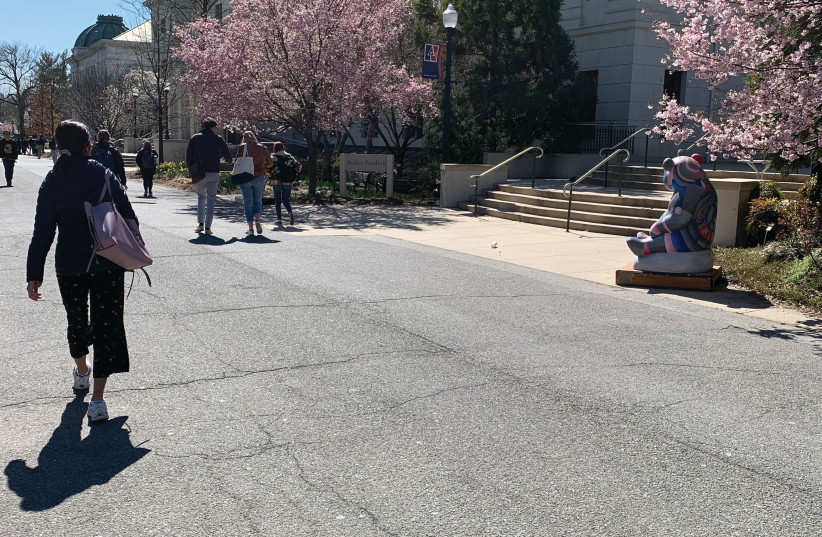More than a quarter of American Jewish millennials say it is okay to distance themselves from Israel to better fit in among friends, according to an American Jewish Committee survey of US and Israeli Jewish millennials. Two thirds of them say it is not okay.
In addition, 23% of Jewish millennials reported that the anti-Israel climate on campus or elsewhere has forced them to hide their Jewish identity, 46% say it has not, and 11% say there is no anti-Israel climate in the US. Furthermore, 28% say the anti-Israel climate on campus and elsewhere has made them rethink their own commitment to Israel, while 54% say it has not.
The AJC survey shows that future Israel-Diaspora relations remain strong, but also indicates points of divergence regarding what role Diaspora Jews should have in influencing Israeli polices, antisemitism in the US and the Israeli-Palestinian conflict.
Parts of the survey reveal major differences in the ways that American and Israeli Jews see their Judaism and the connection or lack of it between the world’s two largest Jewish communities. For example, about 20% of Israelis see their Judaism as a “nationality” whereas hardly any American Jews agreed with this statement.
This is the first-ever parallel surveys of Jews ages 25-40 conducted by YouGov in the US, and by Geocartography in Israel for ACCESS, AJC’s young professional program, and the committee’s Contemporary Jewish Life Department.

The AJC survey of 1,001 Israeli Jews of that cohort was conducted by Geocartography from February 14-22, 2022. The survey of 800 American Jews was conducted by YouGov from February 9 through March 30.
The millennials in the US and in Israel were also asked about policy and the relations between the American Jewish community and the Jewish state. According to the survey, 55% of American millennial Jews and 22% of millennial Israelis say it is appropriate for American Jews to try to influence Israeli policy, while 36% of Americans and 69% of Israelis say it is not appropriate.
Half of Israelis see American Jews as “extended family,” 23.1% as siblings and 19.6% as first cousins.
Just over 80% of American Jews think that a strong Jewish community outside of Israel is necessary for the survival of Israel, yet only 69.6% of Israelis agreed with this statement.
There is a big gap between the opinions on assisting each other. Just 42.3% of Israelis think they personally have to help fellow Jews in the US, while 58.8% of American Jews think they need to help fellow Jews in Israel.
REGARDING THE state of antisemitism in the US, 53% of American Jews and 76% of Israelis say the recent wave of antisemitic events in America is the result of demonizing campaigns against Israel and Jews, while 18% of Americans and 6% of Israelis say it is a natural result of Israel’s policies toward the Palestinians. Some 20% of Americans and 9% of Israelis say it is neither.
Only 9% of Israelis think American Jews experience very little antisemitism in their daily lives, while 10% say they experience it very much, 28% quite a lot and 46% somewhat.
Regarding the Israeli-Palestinian conflict, there is a huge difference between the two groups: More than twice as many Americans as Israelis (52% compared to 24%) say a viable solution to the conflict is possible.
Among those who say a solution is possible, 52% of Israelis and 47% of American Jews favor two independent Israeli and Palestinian states living side by side; 23% of Americans and 5% of Israelis favor one binational state with a single elected government; and 15% of Americans and 19% of Israelis favor Israeli annexation, leading to an extension of Israeli sovereignty in which Palestinians have a unique civil status and are represented by Palestinian municipal leaders.
Significant majorities of American (72%) and Israeli (89%) Jewish millennials say it is important that the American Jewish community and Israel maintain close ties, with 48% of Americans and 46% of Israelis saying it is very important.
Some 90% of millennial Israelis and 80% of millennial American Jews think a strong State of Israel is necessary for the survival of the Jewish people, while 81% of Americans and 70% of Israelis think a strong Jewish community outside of Israel is necessary.
“Gauging the views of millennials is critical to ensuring strong, enduring ties between the world’s two largest Jewish communities,” said AJC ACCESS Global director Dana Steiner. “Our pioneering surveys provide vital insights into the thinking of emerging leaders engaged in Jewish life that will be critical to strengthen mutual understanding and cooperation between American and Israeli Jews, and also address challenges and opportunities.”
